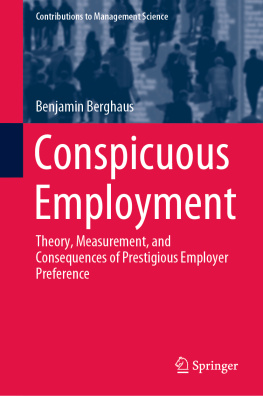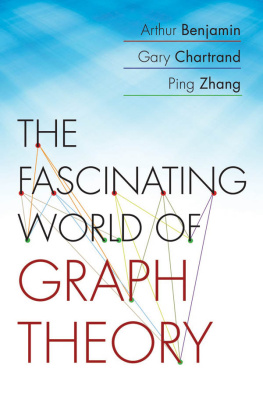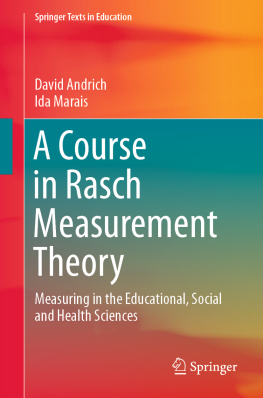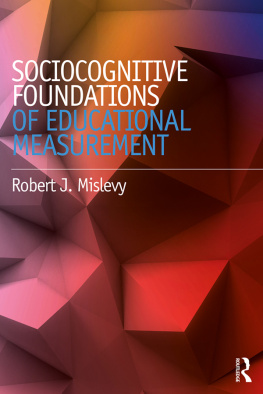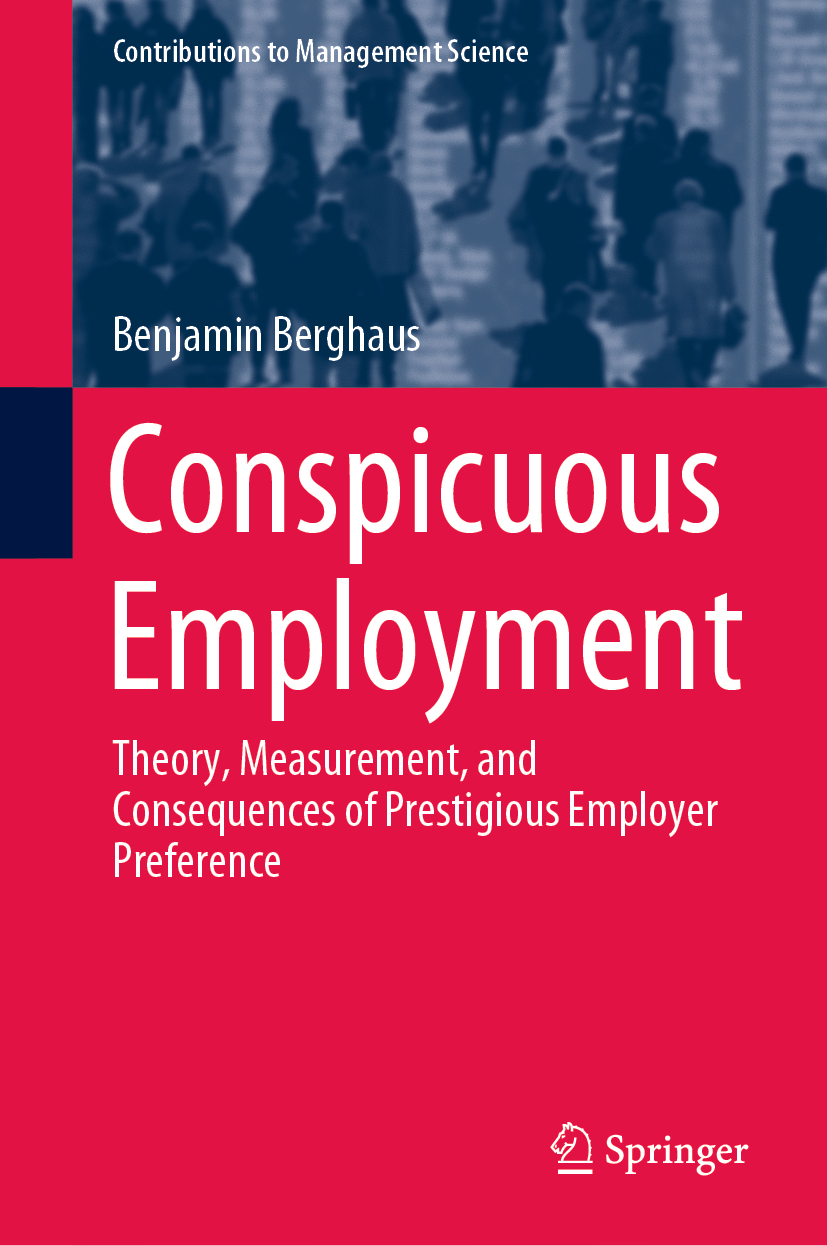Contributions to Management Science
More information about this series at http://www.springer.com/series/1505
Benjamin Berghaus
Conspicuous Employment
Theory, Measurement, and Consequences of Prestigious Employer Preference
Benjamin Berghaus
Institute of Marketing, University of St. Gallen, St. Gallen, Switzerland
ISSN 1431-1941 e-ISSN 2197-716X
Contributions to Management Science
ISBN 978-3-030-37700-7 e-ISBN 978-3-030-37701-4
https://doi.org/10.1007/978-3-030-37701-4
Springer Nature Switzerland AG 2020
This work is subject to copyright. All rights are reserved by the Publisher, whether the whole or part of the material is concerned, specifically the rights of translation, reprinting, reuse of illustrations, recitation, broadcasting, reproduction on microfilms or in any other physical way, and transmission or information storage and retrieval, electronic adaptation, computer software, or by similar or dissimilar methodology now known or hereafter developed.
The use of general descriptive names, registered names, trademarks, service marks, etc. in this publication does not imply, even in the absence of a specific statement, that such names are exempt from the relevant protective laws and regulations and therefore free for general use.
The publisher, the authors and the editors are safe to assume that the advice and information in this book are believed to be true and accurate at the date of publication. Neither the publisher nor the authors or the editors give a warranty, expressed or implied, with respect to the material contained herein or for any errors or omissions that may have been made. The publisher remains neutral with regard to jurisdictional claims in published maps and institutional affiliations.
This Springer imprint is published by the registered company Springer Nature Switzerland AG
The registered company address is: Gewerbestrasse 11, 6330 Cham, Switzerland
Preface
Marketing has matured. In its more modern frame of market-oriented management, marketing is not anymore restricted to apply theory to advertise or sell better, but at a greater libertyand, indeed, demandto provide value across the organisation (Becker and Homburg, 1999). Market-oriented management has made marketing more valuable in the organisation because market-oriented management makes organisations more valuable to their stakeholders.
This study is my attempt to join those who, more capable, transport marketing ideas to those regions of management that may generate greatest benefit from it. Recruitment emerged as the application for this research as it is advancing to become the key managerial setting in need of insight to successfully navigate the challenges of decades to come.
Through the development of my study, two convictions emerged and shaped its implementation: first, applied sciences should not be limited to applying theory. More fundamental disciplines may benefit greatly from interdisciplinary transfer that applied fields can provide. Strengthening the circulating currents of thought between fundamental and applied disciplines is worthwhile. Second, prior research is generally underappreciated. What has been explored in the past is not only of value as a frame for future innovation. Rather, it holds the greatest potential for increasing efficiency in scientific advancement.
Luckily, I was allowed to complete my study in an environment that never stopped challenging my convictions but likewise never stopped encouraging me to find my own way. The result has been one of perceived personal advancements and not one of indoctrinations. For that, I am indebted to my helpful referees and generous colleagues Sven Reinecke and Gnter Mller-Stewensour collaboration has been my privilege.
This study documents more than what is written within. It represents what were some of the best years of my life. Neither this research nor its circumstances have been difficult. Rather, it has been difficult for me to grow into the person it took to complete it. I am grateful to those who inspired, accompanied, supported and joined me in laughter. In one way or another, you helped me complete this to the best of my abilities: Peter M. Fischer, Jasmin Eberharter, Carsten Paulus and Sophie Schller. Verena Batt and Markus Khne. Kirsten Mrkwicka, You-Cheong Lee, Julius Schrder, Christoph Wortmann, Laura Braun and Dennis Herhausen. Alexander Schagen, Erik Klautzsch, and Robert Hohenauer. Christian Belz and Marcus Schgel. Jrgen Gessler and Jan Becker. Thomas Mandl, Klaus Wallraven and Wolfgang Uwe Friedrich. My closest friends. My parents. Sabine.
Benjamin Berghaus
St. Gallen, Switzerland
Confidence is the feeling you have
before fully understanding the situation.
Acknowledgements
This study has been independently developed, implemented and documented by its author. However, select studies benefited from collaboration with other researchers and/or students. These collaborations as well as their degree of influence upon this study shall be made transparent in these acknowledgements.
I am indebted to multiple people who I was fortunate enough to collaborate with during my study for their kind, engaged and thoughtful cooperation. I received support from both of my supervisors Prof. Dr. Sven Reinecke and Prof. Dr. Gnter Mller-Stewens in form of consultations with regard to the study itself and collaboration in terms of the Competence Center for Luxury Management.
In the initial phase of my study, I received conceptual support by Prof. Dr. Peter M. Fischer through discussions of the positioning of the study as well as the collaborative operative steering of the master thesis project by Marco Bichsel who carried out some of the data gathering for the project illustrated in Chap.has been developed and implemented by me and the emerging collaboration was led by me, acknowledgements to my colleagues appear appropriate and are also made transparent throughout the chapter by changing from first person singular to first person plural when describing the actions of the study authors.
In the main phase of my study, I initiated the original idea leading to the SSVS as a basis to generate the data needed for investigating my hypotheses. However, I was joined in the development of the project by Dr. Verena Batt of University of Basel in this initiating stage. With her, I conceptualised the overall study design as well as the central measurement on work values. The development of this measurement is not portrayed in this study as it is not part of this study, but several studies hinge on its contributions. For SSVS and the value scale, Dr. Batts scientific contribution ought to be considered 50% with the remaining 50% resting with me. For the development of the PEP scale, Dr. Batts scientific contribution was negligible with the remaining full contribution resting with the author. Later in the process of the SSVS, Verena Batt and I were joined and consulted by representatives of the Career Services Center of University of St. Gallen (HSG), specifically its Director Markus Khne. None of the above persons substantially and/or directly contributed to the development, operationalisation and evaluation of the scale on PEP nor its related studies presented in this study with the exception of Dr. Verena Batt co-conducting the interviews carried out for the study reported in Sect..

